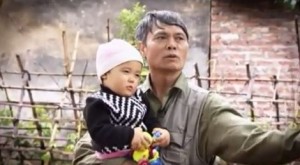Every day, trucks full of used lead-acid batteries from cars, motorbikes and other vehicles are brought in from across Vietnam to the rural village of Dong Mai in the agricultural heartland of Vietnam.
Dong Mai is one of thousands of toxic “craft” villages that dot the Vietnamese landscape.
More like factory collectives, each “craft” village focuses on the manufacture of one product in an informal, cottage industry-type setting. The village of Dong Mai specializes in the recycling of used lead acid batteries.
Years ago, Dong Mai was a village of artisans. Bronze casting was their craft but when that market dried up, they turned to battery recycling in the 1970s.
Hundreds of home smelters and workshops sprang up. Villagers broke batteries by hand, dumped the acid into rivers and sewers, and smelted toxic lead in their backyards.
Toxic lead and batteries became an integral part of village life. Battery casings were used as fences in the village. Waste from the recycling process could be seen piled along the streets.

Today, Dong Mai has some of the highest recorded levels of lead we have ever seen. Many residents in this village of about 2,600 people, like Mr. Bùi Văn Lỏng and his grandsons, suffer chronic illnesses related to lead poisoning.
“I have stomachaches frequently and I have to visit many hospitals for check ups,” says Mr. Bùi. “Many of my neighbors and their children have similar symptoms and have to be hospitalized. Some suffer repeated stomachaches only two to three days after being discharged from the hospital. We never knew the real reason for our pain.”
Mr. Bùi’s family operated a lead recycling workshop in Dong Mai from 1983 to 1990. During that time, he never understood the dangers of lead. The only thing he and his fellow recyclers worried about was the acid.
“We used to drain the acid out of the used batteries and dump the liquid in a public area far from our house… We just simply thought that the acid was not good for us as it could destroy our clothes and stuff,” says Mr. Bùi.
While awareness about the dangers of lead is growing, misconceptions persist.
“We’ve been in this business a long time and we have learnt that lead is harmful to our health,” says Mr. Nguyen Xuân Lơi. His family has been recycling used lead-acid batteries for over 30 years.
He continues confidently: “…if we apply proper protective measures and care for our health, we can minimize the adverse impacts of this business on our health.”
But Madam To, Pure Earth/Blacksmith’s expert in Vietnam, points out that “the villagers think that wearing a normal mask is enough to protect them from the health risks caused from lead pollution. In fact, it is not enough. They should wear a mask specially designed for preventing the inhalation of lead dust. And for those working in lead smelting workshops, they should wear other protective gear as well.”
Since 2000, the local government has tried to contain the toxic activity, moving many lead recycling facilities to an industrial park outside the residential areas.
Pure Earth/Blacksmith has begun construction of special changing rooms for workers to reduce the amount of toxic lead dust they bring home to their families on their clothing and in their hair, especially if they wear inadequate protective gear.
At the same time, we have been holding meetings to educate villagers about the dangers of lead and to answer questions, and going house-to-house to hand out informational flyers.
Most importantly, Pure Earth/Blacksmith has also begun the cleanup of the worst contaminated homes. Many have an average of 4,000 ppm of lead (the U.S. EPA standard is 400 ppm), with the most contaminated areas measuring above 20,000 ppm. To date, we have remediated over 40 homes and yards.
Among them is the grounds of Mr. Bùi’s home. We covered the polluted soil with geotech fabric to block the spread of the toxin. Then a layer of clean soil was placed on top. Now the family can start planting again in their garden.
Plans are currently being made to clean up the rest of the village.
This project was supported in part by Green Cross Switzerland and the Marilyn Broad Foundation. Pure Earth/Blacksmith collaborated on the project with the Vietnamese Center for Environmental Consultancy and Technology (CECT) under the Ministry of Natural Resources and Environment (MONRE), the Vietnamese NGO Centre for Environment and Community Development (CECoD), the University of Washington, and the International Lead Management Centre (ILMC).![]()
From the Project Page:
Vietnam (Dong Mai) – Toxic Craft Village
Local News Coverage:
Watch the video report from Vietnamese TV
Clean-up success at lead recycling village, Vietnam News
Related:





